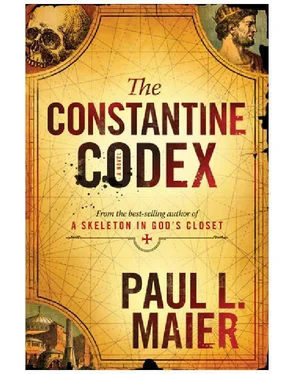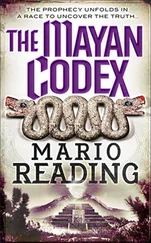Paul Maier - The Constantine Codex
Здесь есть возможность читать онлайн «Paul Maier - The Constantine Codex» весь текст электронной книги совершенно бесплатно (целиком полную версию без сокращений). В некоторых случаях можно слушать аудио, скачать через торрент в формате fb2 и присутствует краткое содержание. Жанр: Триллер, на английском языке. Описание произведения, (предисловие) а так же отзывы посетителей доступны на портале библиотеки ЛибКат.
- Название:The Constantine Codex
- Автор:
- Жанр:
- Год:неизвестен
- ISBN:нет данных
- Рейтинг книги:5 / 5. Голосов: 1
-
Избранное:Добавить в избранное
- Отзывы:
-
Ваша оценка:
- 100
- 1
- 2
- 3
- 4
- 5
The Constantine Codex: краткое содержание, описание и аннотация
Предлагаем к чтению аннотацию, описание, краткое содержание или предисловие (зависит от того, что написал сам автор книги «The Constantine Codex»). Если вы не нашли необходимую информацию о книге — напишите в комментариях, мы постараемся отыскать её.
The Constantine Codex — читать онлайн бесплатно полную книгу (весь текст) целиком
Ниже представлен текст книги, разбитый по страницам. Система сохранения места последней прочитанной страницы, позволяет с удобством читать онлайн бесплатно книгу «The Constantine Codex», без необходимости каждый раз заново искать на чём Вы остановились. Поставьте закладку, и сможете в любой момент перейти на страницу, на которой закончили чтение.
Интервал:
Закладка:
Jon registered appropriate awe but thought, Why their annotations? Today’s scholars have far more resources for commentary than medieval monks! But he held his tongue; he had more important fish to fry.
“And now, my esteemed professor,” Miltiades continued, “please sit down and let us discuss that manuscript of yours about which the archbishop wrote. First of all, where did you find it?”
“I didn’t find it, Your Grace. My wife Shannon did. At Pella in Jordan.”
“Pella, you say?” The face of the archimandrite brightened. “I’ve always thought that if any important early manuscripts were to be discovered, it would be at Pella. Or perhaps at St. Catherine’s on Mount Sinai.”
“Or Mount Athos,” Jon quickly added.
The abbot smiled and agreed. “Or Mount Athos.”
Jon proceeded to give the whole history of the find before opening his attache case. First he took out only four of the five ancient leaves, then renderings of the writings on them enhanced by ultraviolet, providing a much clearer text. Miltiades put on a pair of gold-rimmed glasses and began reading the Greek immediately, occasionally glancing at the originals.
Minutes passed. Jon said nothing. Nor did his host, who reached for a magnifying glass from time to time and held it over the texts. Silence filled the office more audibly than Jon had ever experienced.
Finally Miltiades looked at Jon and said slowly, “This is quite remarkable. I have read some of these words before. I think it was when Eusebius quotes Hegesippus on the death of James the Just of Jerusalem.”
“Exactly, Your Grace. I wanted you to discover that for yourself, rather than with any prompting from me. I congratulate you on your marvelous recall.”
“It is nothing,” he objected. “But here we have more from Hegesippus than what Eusebius quotes. It tells how Jesus’ cousin Symeon became the next bishop of the church in Jerusalem.”
“Precisely. And this is why my wife and I believe these pages come from the lost writings of Hegesippus.”
The abbot shook his head in astonishment. “This is… this is remarkable, Professor Weber, remarkable! But I had not heard of this discov-”
“Only three people on earth know about these pages, Your Grace: yourself, my wife, and I. The priest at Pella knows about the leaves, of course, but not what they contain. Obviously, we wanted to determine their provenance-and even their authenticity-before going public with them. Hence my visit.”
“Yes. Yes of course.” The abbot exhaled heavily. “To me, it looks as if the writing comes from… well… from as early as… the third century. But wait…”
He reached for a reference book on orthography, which compared Greek lettering styles across the centuries. Now his head shifted from one side to the other repeatedly in comparing the shapes of letters, almost as if he were watching some ancient tennis match. Finally he looked up. “Yes. Yes, it is third century indeed. Here, look for yourself.”
Jon compared the evidence and nodded-affecting surprise only because he had also done this comparison with a similar text on Greek orthography back in Cambridge. But yes, it was important to have his conclusions tested by the world authority on ancient Greek texts.
Their conversation now turned to the origin of the ancient leaves. If they came from the third century, then they could well be a first-generation copy of Hegesippus’s original, which had to have been written before his death in AD 180, the abbot told Jon, confirming what he and Shannon had already surmised. “If that is the case, more such leaves from Hegesippus would be priceless. Did your wife inquire about this at Pella?”
“Most certainly. Unfortunately the priest who was using them to hold his place in an aged copy of Eusebius’s Church History had no idea where they came from or when.” Jon went on to disclose his plans for the ICO to do an exhaustive inventory of all written materials at the church in Pella, pending the local priest’s permission.
Next they focused on the question of authenticity. The archimandrite examined the brownish leaves under additional lamps, using his magnifying glass almost constantly. His scrutiny, however, was fairly brief. He lifted his head and said, “Really, Professor Weber, there is no question but that these leaves are genuine and ancient. I think it would be totally impossible to… to… What is the word?”
“To forge, to falsify something like this?”
“Yes, that is what I want to say.”
Jon smiled appreciatively, almost as if his host had made it all possible. Then he reached into his attache case and extracted the fifth brownish leaf and its enhanced copy and laid them on the abbot’s desk, his own heart increasing its tempo as he said, “This final page, Your Grace, is of such great importance that I didn’t want it to color your conclusions.”
Miltiades resumed his reading, showing no response whatever. Halfway through, however, he looked quizzically at Jon before returning to the text. Slowly, his head turned across each line, which he seemed to read and reread. This time he also had much recourse to the original on the left side of his desk, poring over it again and again.
He finally sat up, shook his head, and muttered, “Thaumadzo!”
Jon recognized the verb from the opening lines of St. Paul’s letter to the Galatians: “I am amazed.” Then a torrent of words poured out of Miltiades’s mouth. “Now Hegesippus is talking about the Gospels and how they were written. After Mark and Matthew, he comes to Luke, and… and he writes…” He grabbed the magnifying glass and immediately translated into English. “He writes, ‘After blessed Luke wrote his… first treatise to Theophilus, which we call Luke’s Gospel, and his second treatise to Theophilus, which we call the Acts of the Apostles, he wrote… also a third treatise to the same person, which we call the Acts of the Apostles, Beta,’ that is, the Second Acts of the Apostles.”
The abbot laid down the magnifying glass on his desk between the original leaves and the enhanced version and was silent for some moments. Finally he said, “Now I know why you think these pages are… are so important!”
“Indeed, Your Grace. They could even mean that there is biblical material out there that never got included in the Bible.”
The abbot made a triangle of his fingers and thumbs and nodded pensively.
Jon continued. “Have you ever found any reference to a third treatise to Theophilus?”
Slowly the abbot shook his head. “No. No, I have not. This… this is astonishing.”
“And it may help explain why Luke seems to break off so abruptly at the end of his narrative in Acts, chapter 28. Here he brings St. Paul to Rome, and the reader can’t wait to read about the greatest crisis in the apostle’s life: his trial before Nero. But Luke seems to do a… a fade-out on us, as Americans put it. No trial, just a few words about Paul preaching openly in his rented dwelling for two years.”
“Ah yes. I’ve often thought that this was the most… the most…”
“Frustrating?”
“Yes, the most frustrating passage in all of Scripture.”
Both were silent for a while. Then a wan smile crossed the abbot’s face. “What a treasure it would be for the church-for the world-if that ‘third treatise’ could ever be found.”
“How very true! But do you think that’s even possible?”
A slight frown furrowed the cleric’s brow and he shook his head sadly. “No, I don’t think so. It would have been discovered long ago and be part of our Bible today.” He paused, drummed his fingers on the desk, and resumed speaking. “But your discovery, I think, will be very helpful to explain why the book of Acts ends as it does. Luke had more to say.”
Читать дальшеИнтервал:
Закладка:
Похожие книги на «The Constantine Codex»
Представляем Вашему вниманию похожие книги на «The Constantine Codex» списком для выбора. Мы отобрали схожую по названию и смыслу литературу в надежде предоставить читателям больше вариантов отыскать новые, интересные, ещё непрочитанные произведения.
Обсуждение, отзывы о книге «The Constantine Codex» и просто собственные мнения читателей. Оставьте ваши комментарии, напишите, что Вы думаете о произведении, его смысле или главных героях. Укажите что конкретно понравилось, а что нет, и почему Вы так считаете.












